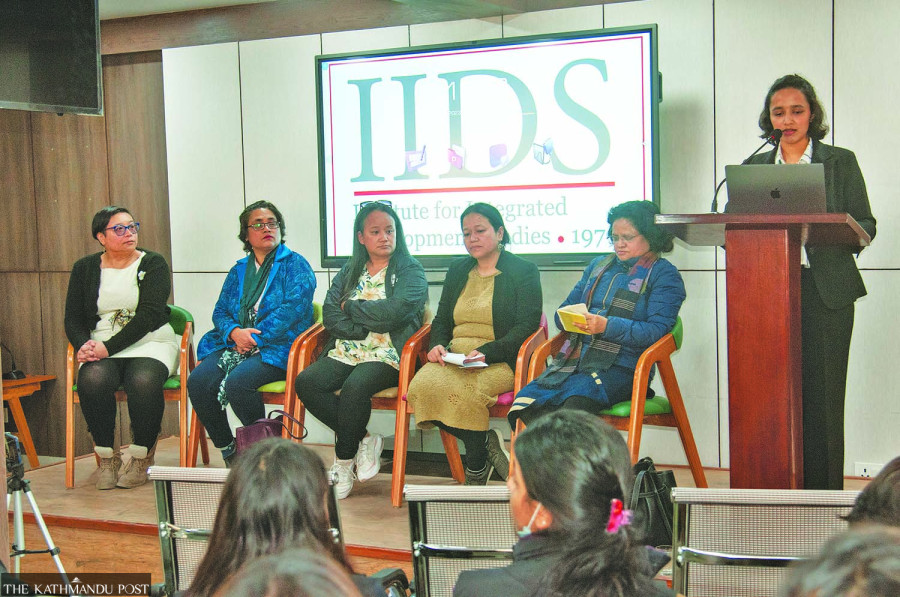Culture & Lifestyle
Channelling the collective rage
‘Everyone in society is a part of the collective failure to provide reparative justice to the victims.’
Mimamsha Dhungel
Department of Gender Studies and the Integrated Institute of Developmental Studies (IIDS) organised a panel discussion on the topic 'Rage against impunity' to raise awareness about the residual culture of impunity and its impact on women and girls from various strata of society on Wednesday at the IIDS Campus, Mandikhatar. Panellists Dr Madhurima Bhadra, Rukmani Maharjan, Kamala Hemchuri, Kailash Rai, and Neeti Aryal Khanal discussed the legal provisions, status quo, and challenges women face while tackling these issues.
The academic discussion sought to raise concerns about the failure of authorities—the criminal justice system in particular—to provide justice to victims of sexual violence. This dialogue aimed to hold those in power accountable for the victims' social injustice, according to the organisers.
According to advocate Maharjan, who is also an assistant professor at Nepal Law Campus, the legal definition of rape in Nepal needs revision and reinterpretation. "If you look at Section 219 of the National Penal Code 2017, rape is defined according to age," Maharjan said, adding that consent takes precedence in the case of women over the age of 18. According to our constitution, rape is a sexual offence committed against women in which they are coerced into having a sexual encounter without their consent through the use of force, intoxication, or deception. There is no consent argument in the case of females under the age of 18. "Any sexual act with a female under the age of 18, with or without consent, falls under statute rape and is a legal offence," Maharjan said.
The panel agreed that the definition of rape should be more inclusive. “Rape is defined as any unlawful sexual activity conducted against the will of any person using force or the threat of force, or with an individual who is incapable of giving consent under any circumstances,” said public health expert Dr Bhadra who also gave a presentation on the health and social consequences of Violence Against Women and Girls (VAWG).
Dr Bhadra discussed in her presentation how women face many forms of violence throughout their lives. Pre-birth sex-selective abortions are still common in Nepal and many other parts of South Asia. Female infanticide or infant sexual abuse is a risk for females as infants. A female child faces child maltreatment, child sexual abuse, female genital mutilation and even forced child marriage. Female adolescent girls are particularly vulnerable to intimate partner violence, sex trafficking, and various forms of sexual abuse. The cycle of violence continues with workplace sexual harassment, femicide (honour killing), and elder abuse. Bhadra talked about the fatal and non-fatal outcomes of VAWG. The fatal outcomes of rape include female honour killings out of social stigma, suicides, AIDS-related mortality, and maternal mortality, according to Bhadra. She also gave a detailed analysis of the physical and psychological damage that a sexual violence victim is subjected to.
“It is deeply upsetting to witness that the only progress that we have had in terms of justice for the victims is postponing the statute of limitation from 25 days to a year. The intergenerational trauma that a victim faces and is compelled to live with isn’t fully understood by those making the law,” said Bhadra.
Khanal from Tribhuvan University's Central Department of Sociology/Anthropology, publicly condemned our society's vicious cycle of victim blaming. "Whether it is TikTok or Facebook, the comment sections are plagued by the disgusting blemishes of patriarchy. Everyone wants a quick fix. Blaming the victim is another perverse way of keeping women in control. It is an easy way out because it allows them to defend the status quo while avoiding the hassle of fixing the system. Victim blaming culture is inextricably linked with rape culture," said Khanal.
According to her, the justice system, as well as the lawmakers, promote a culture of victim blaming. Khanal also emphasised how society is unaware of the negative political, psychological, and economic consequences of VAWG. "If you look at the world, we had to bear an economic loss of $1.2 trillion due to violence against females. There is also the concept of intergenerational trauma. A child who grows up in an abusive family learns that abuse is normal in relationships. This propels a future generation of people who do not recognise abuse in their personal relationships, and normalise and inflict it on others," Khanal said.
Society’s viewpoint of violence against women and girls is also shaped by the portrayal of male-female relationships in literary fiction/non-fiction and mainstream media. Freelance researcher and writer Rai talked about how the idea of violence manifests in larger society through misogynistic and regressive mindsets reflected in films, music and literature consumed by the people.
"It is not enough to discuss the dangers of sexual violence. We also require open discussions about the advantages of consensual sexual intercourse or sexual pleasure. Rape is no longer just a sexual offence, it is also an exercise of power over the “weaker” gender. So, in order to avoid sexual offences or character assassination, sexual freedom is required in society," said Rai. According to her, indigenous women are at a higher risk of becoming victims of racial prejudices and misrepresentation in popular culture. "Patriarchy and victim-blaming have impaired the women in our society. The major challenge to seeking justice is the nuance of patriarchy that makes it normal for women to bring down women."
The panellists also engaged in an extensive discourse on the rights of the marginalised and systematically oppressed communities of Nepal. Dalit activist Hemchuri said that a cultural revolution is needed to tackle rape and gender based violence in the society. “The social construct that brings violence against women and minorities is based on culture, religion and tradition backed up by the state. Similarly, the preconceived notion against Dalits or minorities is handed down to the next generation. And this is where we need intervention—at the grassroots level,” said Hemchuri.
The social stratification creates a dangerous environment for especially women from marginalised communities to be exploited. The state has systematically failed to address this issue. “When we look at the gender inequality index of Nepal, it is 0.692. During legal trials, questions on the character and credibility of the victim are raised. A victim remains anonymous because it is their constitutional right to privacy and confidentiality. Society decides to storm the media landscape with hate speech and victim shaming, which is problematic,” said Khanal.
It is important to understand that the connotation of impunity is not just the lack of accountability of the state or the government alone. Everybody in the society is a part of the collective impunity in one way or another, according to the panellists. Rai said that we let go of perpetrators because they are national figures or politicians or influencers and this is where justice is denied to the victim. “We have to have rage against the impunity shown by the government because there is no accountability in terms of reparative justice or mitigating the numbers of increasing sexual violence in the country,” said Hemchura. Bhadra adds that the conversations regarding reparative justice should prioritise the survivor’s wellbeing, and it isn’t enough to just be enraged and demand legal justice and compensation.
Panel discussions like these are extremely necessary to make sure that women don’t feel stateless, said the organiser Dr Sucheta Pyakuryal from IIDS. “We wanted to make sure that we hold each other accountable for the lack of social justice and liability towards the victims of VAWG,” she added.
Sandip Bhandari, an intern at IIDS, was one of the few male participants in the event. “This discussion gave a completely different perspective regarding whatever's going on in the country right now. I now feel more responsible towards generating awareness regarding legal protection provided against sexual violence,” Bhandari said.
Human rights activist Shriya Chaubey said, “We are failing as a society, especially when one looks at the judicial outcomes regarding rape cases. Discussions like these help us understand why such failures occur and what causes them. Youth participation in such programmes is critical for helping them understand things from a more knowledgeable perspective. An open floor discussion gives everyone the confidence to voice their concerns, help understand the problem better, and create opportunities for better solutions,” she concluded.




 9.7°C Kathmandu
9.7°C Kathmandu

.jpg&w=200&height=120)













